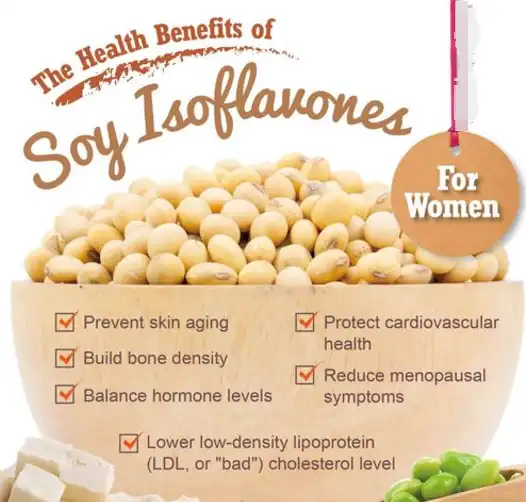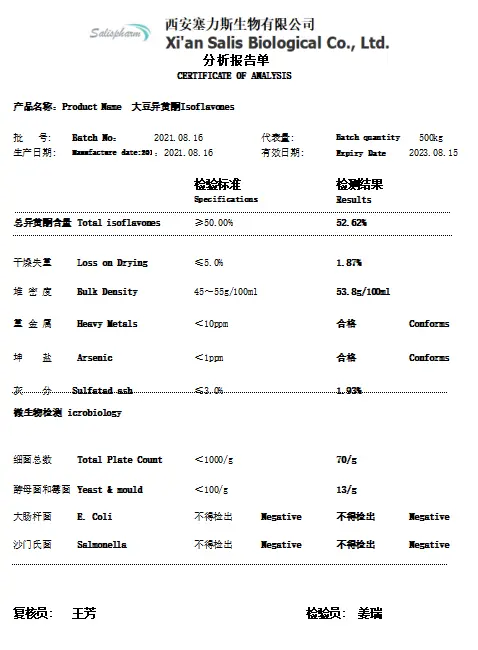Soy isoflavones powder has gained significant attention in recent years for its potential benefits in supporting healthy estrogen levels. As a natural plant-based compound, soy isoflavones are structurally similar to estrogen and can interact with estrogen receptors in the body. This unique property allows soy isoflavones to help regulate estrogen levels, particularly in women experiencing hormonal imbalances or going through menopause. In this blog post, we'll explore the relationship between soy isoflavones powder and estrogen levels, addressing some common questions and concerns.

What are the benefits of soy isoflavones for menopause symptoms?
Soy isoflavones powder has shown promising results in alleviating various menopause symptoms. As women transition through menopause, their estrogen levels naturally decline, leading to a range of uncomfortable symptoms. Soy isoflavones can act as a natural alternative to hormone replacement therapy, helping to ease these symptoms and improve overall quality of life.
One of the most notable benefits of soy isoflavones for menopausal women is the reduction of hot flashes. Hot flashes are sudden feelings of intense heat, often accompanied by sweating and flushing, and can be incredibly disruptive to daily life. Several studies have demonstrated that regular consumption of soy isoflavones can significantly reduce the frequency and severity of hot flashes. This effect is thought to be due to the ability of isoflavones to mimic estrogen in the body, helping to stabilize body temperature regulation.
In addition to hot flashes, soy isoflavones may also help alleviate other common menopause symptoms such as night sweats, mood swings, and vaginal dryness. The estrogen-like effects of isoflavones can help maintain the health of vaginal tissues, reducing discomfort and improving overall sexual health. Furthermore, some women report improvements in mood and cognitive function when supplementing with soy isoflavones, which may be attributed to the compound's ability to support brain health and neurotransmitter balance.
Bone health is another area where soy isoflavones may provide significant benefits for menopausal women. As estrogen levels decline, the risk of osteoporosis increases. Soy isoflavones have been shown to help maintain bone density by promoting bone formation and reducing bone resorption. This protective effect on bone health can be particularly important for postmenopausal women who are at higher risk for fractures and osteoporosis.
It's important to note that while soy isoflavones can be beneficial for many women experiencing menopause symptoms, individual responses may vary. Some women may experience more pronounced effects than others, and it may take several weeks or months of consistent use to notice significant improvements. As with any supplement, it's advisable to consult with a healthcare provider before incorporating soy isoflavones powder into your routine, especially if you have any pre-existing health conditions or are taking medications.
How much soy isoflavones should I take daily for estrogen balance?
Determining the optimal dosage of Soy Isoflavones Powder for estrogen balance can be a complex process, as individual needs may vary based on factors such as age, overall health, and specific hormonal imbalances. However, research and clinical studies have provided some general guidelines that can serve as a starting point for those considering soy isoflavone supplementation.
Most studies on soy isoflavones have used doses ranging from 40 to 160 mg per day, with many finding significant benefits at doses of 50-100 mg daily. For menopausal symptoms specifically, a common recommendation is to start with 50-80 mg of soy isoflavones per day, divided into two doses. This dosage has been shown to be effective in reducing hot flashes and other menopausal symptoms in many women.
It's important to understand that soy isoflavones come in different forms, with the most active compounds being genistein and daidzein. When choosing a soy isoflavones powder or supplement, look for products that specify the amounts of these individual isoflavones. A high-quality supplement should provide a balanced ratio of genistein and daidzein, as these compounds work synergistically to produce the most beneficial effects.
For those looking to support bone health, some studies have used higher doses of soy isoflavones, up to 110 mg per day. However, it's crucial to note that more is not always better, and excessively high doses of soy isoflavones may not provide additional benefits and could potentially lead to unwanted effects.
When starting soy isoflavone supplementation, it's often recommended to begin with a lower dose and gradually increase it over time while monitoring your body's response. This approach allows you to find the optimal dosage that provides the desired benefits without causing any adverse effects. Keep in mind that it may take several weeks or even months to notice significant improvements in symptoms or hormonal balance.
It's also worth noting that dietary sources of soy isoflavones, such as tofu, tempeh, and soy milk, can contribute to your daily intake. If you regularly consume soy foods, you may need to adjust your supplemental dosage accordingly. A healthcare provider or registered dietitian can help you determine the appropriate total intake of soy isoflavones from both dietary and supplemental sources.
Lastly, while soy isoflavones are generally considered safe for most people, it's essential to consult with a healthcare professional before starting any new supplement regimen, especially if you have a history of hormone-sensitive conditions or are taking medications that may interact with soy isoflavones. They can provide personalized recommendations based on your individual health status and needs, ensuring that you're using soy isoflavones safely and effectively for optimal estrogen balance.
Can soy isoflavones increase estrogen in males?
The question of whether Soy Isoflavones Powder can increase estrogen levels in males has been a topic of considerable debate and research in recent years. While soy isoflavones are known to have estrogen-like effects in the body, their impact on male hormonal balance is more nuanced than a simple increase in estrogen levels.
Firstly, it's important to understand that soy isoflavones are phytoestrogens, which means they are plant-based compounds that can interact with estrogen receptors in the body. However, their effects are generally weaker than those of endogenous estrogen produced by the body. In males, the concern has primarily been whether consuming soy products or soy isoflavone supplements could lead to feminizing effects or disrupt testosterone production.
Numerous studies have investigated the effects of soy isoflavones on male hormonal health, and the overwhelming majority have found no significant negative impacts on testosterone levels or male reproductive health. In fact, a comprehensive meta-analysis published in the journal Fertility and Sterility in 2010 examined 15 placebo-controlled studies and concluded that neither soy foods nor isoflavone supplements had any effect on bioavailable testosterone concentrations in men.
It's worth noting that the body's response to soy isoflavones can vary between individuals due to factors such as genetics, gut microbiome composition, and overall health status. Some men may be more sensitive to the effects of phytoestrogens than others, but this sensitivity is not common and does not typically result in clinically significant hormonal changes.
In terms of potential benefits, some research suggests that soy isoflavones may actually have positive effects on male health. For example, studies have shown that soy consumption may be associated with a reduced risk of prostate cancer, which is thought to be due to the antioxidant and anti-inflammatory properties of isoflavones. Additionally, soy isoflavones may support cardiovascular health in men by helping to lower cholesterol levels and improve blood vessel function.
It's also important to consider the context of soy isoflavone consumption. The amounts typically consumed in a balanced diet, even in cultures where soy is a dietary staple, are unlikely to cause hormonal imbalances in men. Issues are more likely to arise with extremely high doses of isolated soy isoflavones, which are not representative of normal dietary intake.
For men considering soy isoflavone supplementation for specific health reasons, it's crucial to consult with a healthcare provider. They can provide guidance on appropriate dosages and monitor for any potential effects on hormonal balance. In most cases, moderate consumption of soy foods or supplements is considered safe and may even offer health benefits for men.
Conclusion
While Soy Isoflavones Powder can interact with estrogen receptors in the body, current scientific evidence does not support the notion that they significantly increase estrogen levels or cause feminizing effects in males when consumed in reasonable amounts. As with any dietary change or supplement regimen, moderation and professional guidance are key to ensuring optimal health outcomes.
If you are also interested in this product and want to know more product details, or want to know about other related products, please feel free to contact lea_slsbio@163.com,WhatsApp+86 13193326505.

References
1. Messina M. Soy and Health Update: Evaluation of the Clinical and Epidemiologic Literature. Nutrients. 2016;8(12):754.
2. Taku K, et al. Effects of soy isoflavone extract supplements on bone mineral density in menopausal women: meta-analysis of randomized controlled trials. Asia Pac J Clin Nutr. 2010;19(1):33-42.
3. Lethaby A, et al. Phytoestrogens for menopausal vasomotor symptoms. Cochrane Database Syst Rev. 2013;(12):CD001395.
4. Hamilton-Reeves JM, et al. Clinical studies show no effects of soy protein or isoflavones on reproductive hormones in men: results of a meta-analysis. Fertil Steril. 2010;94(3):997-1007.
5. Messina M. Soybean isoflavone exposure does not have feminizing effects on men: a critical examination of the clinical evidence. Fertil Steril. 2010;93(7):2095-104.
6. Sathyapalan T, et al. The effect of soy phytoestrogen supplementation on thyroid status and cardiovascular risk markers in patients with subclinical hypothyroidism: a randomized, double-blind, crossover study. J Clin Endocrinol Metab. 2011;96(5):1442-9.

